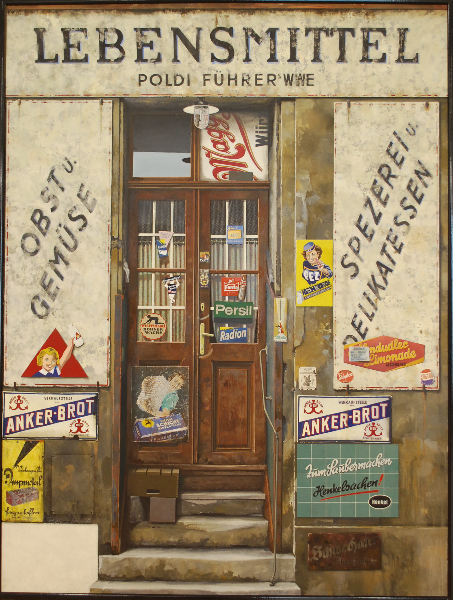Our recommendation: Franz Zadrazil, the keeper of urban secrets
Your first urge might be to go and check if it’s real. The nameless painting (2004) reminiscent of a large scale weather-chipped US advertisement for something that could be a motel in, for instance New Mexico, is incredibly authentic with its optic of a peeled-off enamel and bleeched paint, coroded spots and the uneven shades of one colour. Aware of its impact on visitors, the staff of Essl Museum has set up the warning “please, do not touch the artwork”, just a couple of inches short of this oil on wooden panel.
Unless you’re Austrian, it is hardly likely that you’ve ever heard of Franz Zadrazil (1942-2005) before. But, as you slowly approach his 130×130 large oil on novopan Pintchik Country (1984), you might be slightly surprised by the sudden feeling of déjá vu. The next thing you know, you’ll be thinking of Desperate Housewives, or rather – of a short, but eye-catching glimspe of the Pintchik Country mural in its opening credits.
As one moves through the exhibition’s rooms, more paintings of building facades, antiquitated advertisements, grafitti and architecture in “decay” – coroded constructions, crumbed walls and areas of wear and patination, unfold in front of one’s eyes. The absence of people is noticeable. Zadrazil was, after all, interested in depicting, as Angela Stief describes in her essay ‘Faces of facades’ – “human solitude and isolation amidst the hubbub of modern life”.
Born 1942 in war-torn Vienna, from the moment he took a paintbrush in his hand, Zadrazil was attracted by big cities’ symbols of decay and buildings with “a bit of story to tell”. He portrayed the hidden or forgotten corners of Vienna, Paris and New York, showing their least flattering faces with warm affection.
Motives that Zadrazil painted were based on black & white photographs shot on his long strolls through the streets of Vienna, Paris and New York. He was very picky in his choice of odd, bizzare or ruined and hidden details in urban landscapes, looking for that little something that appealed to him. Despite of using photographs as the basis for his paintings by projecting the negative image onto the substrate, Zadrazil is not a “photorealist”. In his contribution to the exhibition catalogue, Andreas Hoffler explains why: “The American photorealists wanted to depict as closely as possible the special colouring and focus or lack of focus of their photographic model. Zadrazil was not interested in that at all, he was far too much of a painter, a creator of a unique colouring and image mood that may be far removed from the original model…”
Exhibition ‘Franz Zadrazil’ is open until 28th October.
Tuesdays to Sunday, ESSL Museum offers cost-free shuttle service with busses from Albertina Museum in Vienna: 10 a.m, 12 a.m., 2 p.m and 4 p.m

















